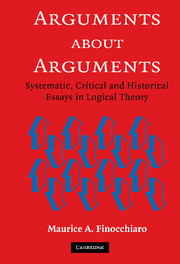Book contents
- Frontmatter
- Contents
- Preface and Acknowledgments
- Introduction : An Approach to a Branch of Logic
- Theorizing about reasoning and argument
- Fallacies and asymmetries
- Critiques
- Historical analyses
- 18 The Concept of Ad Hominem Argument in Galileo and Locke (1974)
- 19 Newton's Third Rule of Philosophizing : A Role for Logic in Historiography (1974)
- 20 Logic and Rhetoric in Lavoisier's Sealed Note : Toward a Rhetoric of Science (1977)
- 21 The Concept of Judgment and Huygens' Theory of Gravity (1980)
- 22 Empiricism, Judgment, and Argument : Toward an Informal Logic of Science (1988)
- 23 Criticism, Reasoning, and Judgment in Science (1995)
- Selected Bibliography
- Index
19 - Newton's Third Rule of Philosophizing : A Role for Logic in Historiography (1974)
from Historical analyses
Published online by Cambridge University Press: 05 February 2015
- Frontmatter
- Contents
- Preface and Acknowledgments
- Introduction : An Approach to a Branch of Logic
- Theorizing about reasoning and argument
- Fallacies and asymmetries
- Critiques
- Historical analyses
- 18 The Concept of Ad Hominem Argument in Galileo and Locke (1974)
- 19 Newton's Third Rule of Philosophizing : A Role for Logic in Historiography (1974)
- 20 Logic and Rhetoric in Lavoisier's Sealed Note : Toward a Rhetoric of Science (1977)
- 21 The Concept of Judgment and Huygens' Theory of Gravity (1980)
- 22 Empiricism, Judgment, and Argument : Toward an Informal Logic of Science (1988)
- 23 Criticism, Reasoning, and Judgment in Science (1995)
- Selected Bibliography
- Index
Summary
A Logical Approach
Newton's Third Rule of Philosophizing has recently been investigated from several points of view: by studying the vicissitudes of its metamorphosis from “hypothesis” to “rule,” the fact of its augmentation by four sentences in the third edition of the Principia, the Aristotelian and neo-scholastic flavor of some of its language, the scholarly significance of its editorial history. All these investigations have been carried on with relatively little concern for the actual intellectual content of the rule itself. The following analysis is intended to supplement and not to replace the studies previously undertaken. The supplement, however, is a necessity, not a luxury, and the historian can neglect it only at his own loss.
What does the rule actually say? Here too the discussion will start with a quotation of the standard English translation, but that will not be followed by a comparison with previous English translations, other language translations, the Latin text of the third edition, that of the second, that of the first, the various drafts of it that can be found among Newton's private papers, and other analogous rules and principles formulated by Newton's contemporaries, predecessors, and successors. Instead I shall proceed to analyze the rule logically, which too could be regarded as a comparison of sorts, a comparison with certain ideals and universals present in the human mind. In my view this kind of comparison — logical analysis — is prior to all the others.
- Type
- Chapter
- Information
- Arguments about ArgumentsSystematic, Critical, and Historical Essays In Logical Theory, pp. 340 - 349Publisher: Cambridge University PressPrint publication year: 2005



